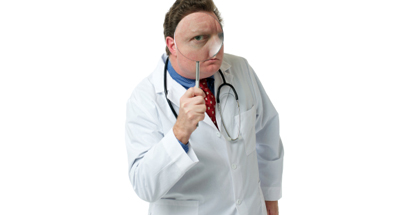It’s amazing how much good business is put in harm’s way because producers don’t know the pitfalls that can occur with insurance exams and screening laboratory tests. What’s more, these consequences are largely avoidable. That is, if you know what they are and take the proper precautions.
Basic Guidelines
- Wizened producers always try to get their clients examined in the morning. Blood pressure levels are usually lowest in the morning, before the stresses of the working day are brought to bear on them.
- No eating within two hours of lab testing is a hard and fast rule.
- Blood sugar rises after a “healthy” dose of donuts and blood sugar (glucose) levels between 45 and 100 minutes later will exceed the laboratory’s normal limits (which are based on the presumption of overnight fasting).
- Little things–having a full bladder, being in a cold room or the unwitting use of a regular-sized blood pressure cuff on a muscular (or fat) arm–can cause unexpected elevated blood pressure readings.
Caffeine
If your client routinely consumes a hefty dose of caffeinated coffee, it is best if he drinks the same amount he is accustomed to on the day he is examined. On the other hand, an out-of-pattern caffeine excess can provoke a rise in blood pressure over the ensuing several hours.
Furthermore, all diabetic applicants should strictly avoid caffeine within 120 minutes of an examination, lest it adversely affect their blood sugar level.
Bottom line: The morning of a paramedical would not be savvy timing for an extra shot or two of espresso!
Smoking
If your client smokes just one cigarette within two hours of having his blood pressure checked, the effects can easily push borderline BP levels into the debitable range. If your client’s usual blood pressure is in the 135/85 range or higher, he needs to avoid a burst of nicotine ingestion in close proximity to being examined.
Smoking can also trigger transient heart rhythm irregularities. When this happens, the underwriter may be obliged to further scrutinize your client by insisting that an ECG (electrocardiogram) be done.
Understand that, in this setting, an ECG would not have been done if your client had not had this irregular pulse. Suppose this ECG shows an unexpected left bundle branch block? If it does, the outcome will almost certainly be a hefty rating.
The sad truth is that this lamentable sequence (arrhythmia, abnormal ECG rated policy) was set in motion for one reason: Your client chose the wrong time for a nicotine fix!
Exercise
Exercise is another seemingly innocuous scenario capable of reeking havoc. Vigorous exercise within several hours of specimen collection may induce a quantity of urinary protein readily mistakable for kidney damage.
Two liver enzyme tests included in all blood profiles –ALT (formerly SGOT) and ALT (formerly SGPT)–can be elevated to five or more times their normal limit if your client engages in a highly strenuous sports activity up to seven days prior to insurance screening. Marathons, triathlons, endurance biking and similar competitions have been shown to induce this effect.
When this happens, many underwriters will subject your client to further testing, most likely for hepatitis C and/or for heavy alcohol use with the carbohydrate-deficient transferrin (CDT) test. And, even if these tests are reported back as normal, your client is still likely to be rated for the ALT and AST elevations!
Prostate Specific Antigen (PSA) Test
Does your company screen late-middle-aged and elderly male applicants with the prostate specific antigen (PSA) test? A substantial portion of life companies routinely do this, sometimes at comparatively low face amounts. If your client requires this test, having a digital rectal exam or prostate gland massage the day before his blood is collected could lead to a transient rise in his PSA level. This means that if his usual PSA reading is on the high end of the normal range, the new test could have an elevated level.
Stress
We all know stress can lead to profoundly adverse physical and emotional consequences. Its effects can also impact multiple domains of routine insurance screening, including blood pressure, heart rate/rhythm and even blood sugar readings.
To minimize this risk, a rule of thumb is to defer a scheduled exam whenever the client is not feeling well and doubly so if he is experiencing pain (for whatever reason, known or otherwise). This rule also applies to fender-benders on the way to the office, unresolved major arguments with family members and significant stress in just about any other context. It is far easier to reschedule a paramedical than to grapple with the fallout from stress-induced adverse effects.
A conservative approach is also indicated if your client was ill in the last few weeks or just got out of the hospital. Who can predict what unforeseen adversities might come about as a result of residual stressors, medications taken and other considerations?
Medications and Herbs
It is likely that the leading cause of abnormal laboratory test results among insurance applicants is the effects of medications. The American Association for Clinical Chemistry published an 858-page small-print tome on this subject some years ago. It would be hundreds of pages longer if updated today for medicines approved since then.
Consider two examples of how medications can affect tests:
At least 10% of individuals taking one of the statin cholesterol-lowering drugs will have elevations of the ALT test, especially in the early months after starting the drug. These high readings have no health significance, but they can result in a rated policy.
Kava is an herb used for anxiety and sleeping problems. It can substantially elevate the liver enzymes GGT and alkaline phosphatase. Both of these tests are on the insurance screening blood profile. There are hundreds of other examples one could cite.
So what is the “take-home” message? Your client is well-served to meticulously disclose all medications he currently takes or has recently used. This includes:
- Prescription drugs
- Remedies purchased over-the-counter
- Herbs and other substances used as general health supplements or for specific reasons
Forthright disclosure of pharmaceuticals is even more important today because over 70% of life insurers use pharmacy records to screen applicants.
The last thing you need is for an unacknowledged drug to appear on one of these profiles, inexorably raising the underwriter’s antennae about what else your client may have “forgotten” to mention!
Bottom Line
None of the fail-safe measures cited here are particularly complex or arduous.
If you are mindful to them, you will greatly minimize avoidable exam and lab test problems with your new business.
 AgenteNews Insurance Producer's Online Resource
AgenteNews Insurance Producer's Online Resource





